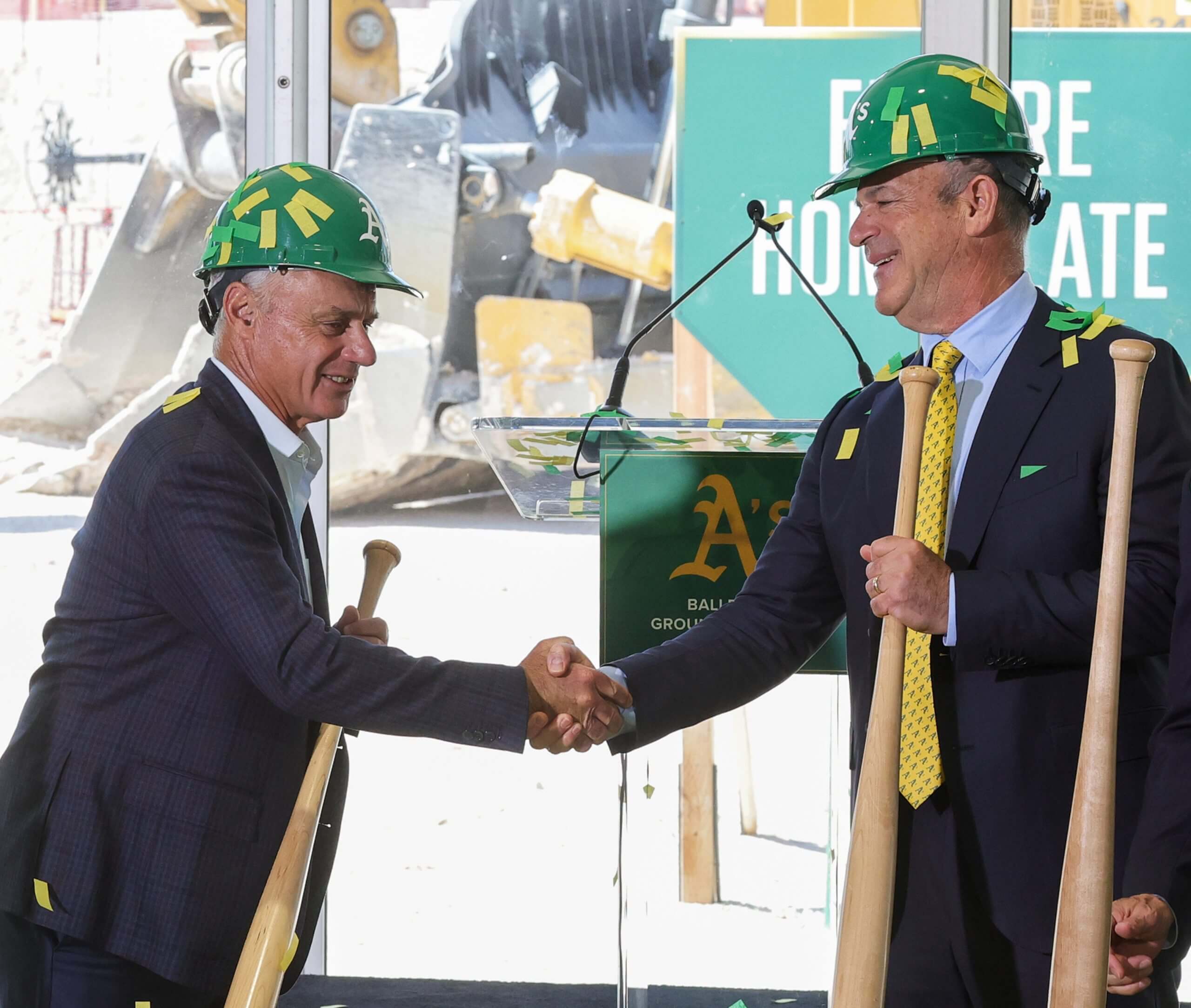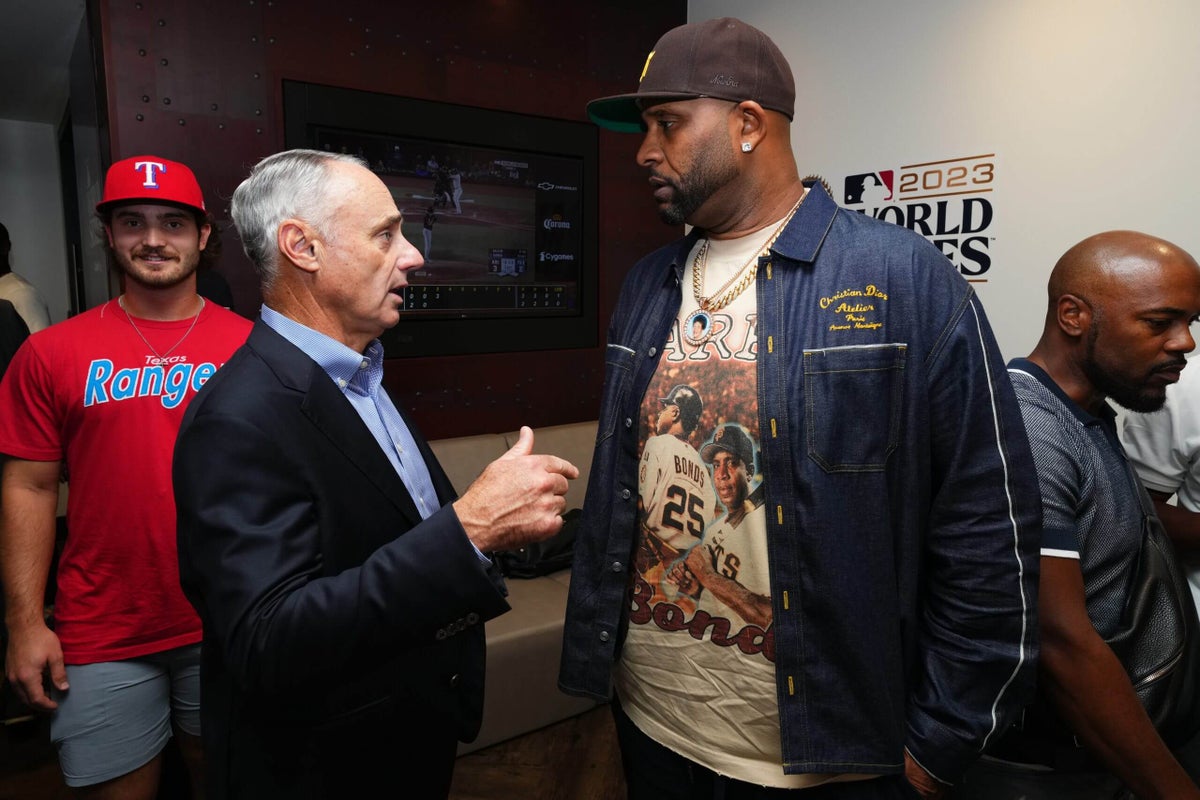The Major League Baseball Players Association believes commissioner Rob Manfred is trying to use the clout of highly respected, retired big leaguers to undermine the union and convince today’s players to accept a salary cap.
In 2023, Manfred formed a group called the Commissioner’s Ambassador Program, or CAP. Participants travel to significant league and community events, and also serve as liaisons to current and future players. MLB has quickly built up a robust roster of 19 players, highlighted by CC Sabathia, who will be inducted into the sport’s Hall of Fame on Sunday. Two other recent greats, Ryan Howard and Jimmy Rollins, are in CAP’s leadership as well.
But CAP’s founding has also created tension and an awkwardness with the group that has historically served as the liaison between the players and the commissioner’s office: the union. Tony Clark, the head of the MLBPA and a playing contemporary of virtually all of the ambassadors, last week told The Athletic that he has advised players in CAP “to stay away from the conversations about labor.”
Earlier in July, MLBPA’s second-in-command, deputy Bruce Meyer, was critical of the program on the television show Foul Territory.
“I obviously wasn’t a player,” Meyer, a lawyer, said during that appearance. “All due respect to anybody who played the game, and in terms of what guys choose to do in their post-careers, I’m not going to question that. I will say, there are players who are being paid by MLB and who are going with Rob to the locker rooms and trying to sell players on a system that this union has historically thought was bad for players, and that they themselves didn’t have to live under when they played.”
Manfred has been touring clubhouses this season, suggesting players have lost billions over the years because they have been unwilling to change the game’s economics.. At times, he has been accompanied by CAP members.
“Players know when they see those guys in the locker room, with Rob pitching a system that the league wants — players know those guys are getting paid,” Meyer continued on Foul Territory. “It may be great players. It may be former teammates, it may be guys they respect. But I think players take it for what it is. Players understand what’s going on.”
When approached by The Athletic at baseball’s All-Star Game in Atlanta last week, Manfred countered that, “They’re not out there carrying my water on what I think on any topic, forget labor.”
CAP participant Dexter Fowler said on Foul Territory recently that players in the program just want to grow the game. Fowler and two other CAP members declined interview requests for this story. Efforts by The Athletic to reach a fourth CAP participant were unsuccessful.
The group did not come out of the blue. When baseball’s lockout ended in 2022, Manfred publicly committed to doing more to build relationships with his workforce, an area he admitted he had fallen short. CAP is part of that effort.

Before the All-Star Game, Rob Manfred attended the ceremonial groundbreaking for John Fisher’s planned ballpark for the Oakland A’s in Las Vegas. (Ethan Miller / Getty Images)
“They do a wide variety of things for us,” Manfred said before the All-Star Game. “They’re here, provide a presence at special events. They have worked with us on our international (efforts). They have been a source of content creation. They’ve helped me in terms of on-field issues. They’ve helped us in terms of dialogue with players.”
The commissioner also began to meet annually with virtually every team as part of his reconciliatory effort. But those visits have become controversial because the MLBPA believes Manfred is using those settings — and the CAP players who are sometimes in tow — to launder his bargaining positions. At least one CAP player, Sabathia, holds an additional role with the commissioner’s office beyond his position as an ambassador.
“I will tell you, 100 percent, in most player meetings, I do all the talking,” Manfred said. “(Ambassadors) may be with me. They may listen afterwards. … I don’t say this, but, you know, some players would rather not ask a question of me, OK? Whatever’s said in there comes from me. Afterwards, if they want to talk, if they have a question that they want to ask (the ambassadors), they ask them.”
Manfred has said that his message to players is not centered on a particular solution, a cap or otherwise. Much of his message, as he has publicly described it, however, is suggestive of a cap.
“I never use the word salary within one of cap,” he said last week.
Ultimately, Manfred believes he has heard the criticism and done what he promised: built a bridge to the current players. He thinks the union now does not want to reap what it sowed.
CAP carries a more star-studded roster than the union’s own cadre of former players, issuing what appears almost a quiet challenge to the MLBPA to keep up. Besides Howard, Rollins and Sabathia, CAP includes Dellin Betances, Michael Bourn, Prince Fielder, Dexter Fowler, Jeremy Guthrie, LaTroy Hawkins, Adam Jones, Andruw Jones, Jason Kendall, Kenny Lofton, Jed Lowrie, Gary Sheffield, Denard Span, Nick Swisher, Justin Upton, Shane Victorino and Chris Young (the outfielder).
The public dust-up over CAP began at the start of July when two former players had a tense discussion on TV. Former big leaguer A.J. Pierzynski, one of the hosts of Foul Territory, asked pointed questions of Fowler during a long back-and-forth.
“My question as a former player: What side are you on?” Pierzynski asked at one point. “Because you work for the commissioner, and then so Rob’s giving you his side, but then Tony and the union has a different side.”
“We’re on baseball’s side,” Fowler replied twice.
“I understand that, but there’s two sides to it,” Pierzynski said.
“I don’t think you have to pick a side,” Fowler said.
A short while later, Pierzynski asked Fowler why he didn’t work for the union instead.
“We are,” Fowler said. “Us going to talk to players is working with the union, right? … We’re forming basically our own opinions on what is going on, and giving honest feedback to Rob about the player side, even the management side.”
About a week after Fowler’s interview, Meyer, the players’ lead negotiator during collective bargaining, appeared on Foul Territory and was asked about a wide range of labor-related topics, including CAP.
At the All-Star Game, The Athletic asked Pierzynski what prompted the line of questioning about the program.
“As a former player, I only know the player’s side,” Pierzynski said. “When you see players go work for the commissioner — I have no problem with Rob — but when you see that, I want to hear their side. And Dex was great. He was perfect with his answer, and I have no problem with it. I see where he’s coming from, I see what he’s doing: ‘We’re about growing the game, and that’s it.’”
But conversations about player relationships with management are always going to be touchy.
“Players try to unite, and then the owners want to unite,” Pierzynski continued. “So I think it just gets complicated, it gets ugly because it’s a negotiation like anything else. It shouldn’t be that complicated, but it always ends up complicated.”
Said Clark in Atlanta: “Once you’re a part of the fraternity, you’ll always be a part of the fraternity. There are challenges that we have to navigate.”
(Top photo of Rob Manfred and CC Sabathia talking before Game 1 of the 2023 World Series: Cooper Neill / MLB Photos via Getty Images)

